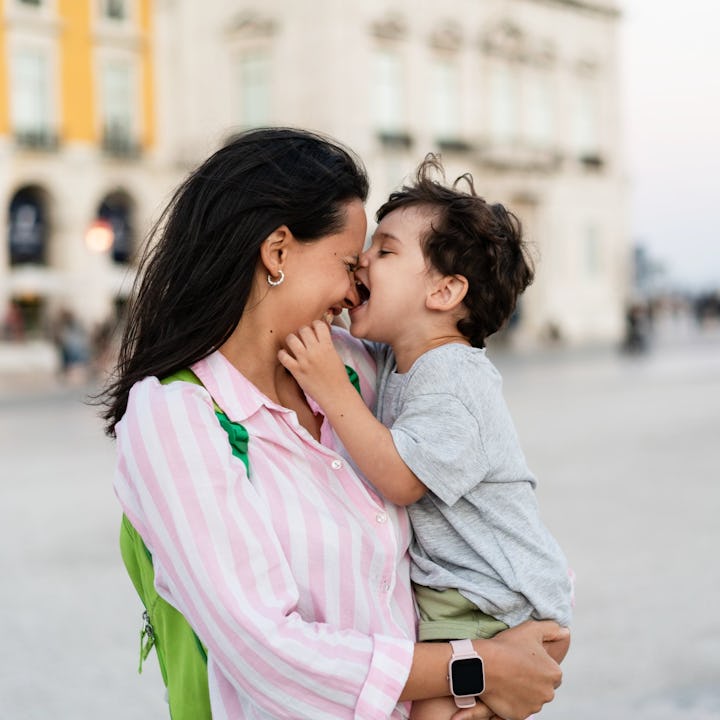Raising My Child In A Top-Ranked Country For Families Changed Everything I Thought About Motherhood
The postnatal care alone is mind-blowing.

Before becoming a parent, I was overwhelmed by the idea. As I saw it growing up, motherhood demanded sacrifices I wasn’t willing to make: losing time, setting aside ambition and even your sense of self to become “mom.” Instead, I focused on my career, spending seven years building my business. Spending nights working on my financial education platform and early mornings recording my podcast felt far more fulfilling than contemplating motherhood.
But in 2023, after moving to the Netherlands from the United States to continue my career growth, the surprising yet welcome news of my first pregnancy came. Living in a country consistently ranked as one of the best for families played a pivotal role in shifting my perspective on motherhood, transforming it into a much better, anxiety-free new phase of womanhood.
Pregnancy felt completely different from what I had imagined or seen in movies and among friends. I pictured a clinical, tense environment and prepared to be treated like someone on the verge of fragility. Instead, when I walked into my first midwife appointment, I was welcomed into this new phase of life by moms with bellies much larger — think 30 weeks along — than mine, casually biking to their appointments.
From that very moment, I knew this experience would be different.
Motherhood, starting with pregnancy, is treated as a natural phase of life in the Netherlands. It’s not something requiring constant tiptoeing or endless restrictions unless you are medically required. Doctors, midwives, and even strangers encourage you to trust your body and adapt as needed. This approach immediately eased my fears of losing myself or my entrepreneurial ambition to motherhood.
After giving birth, I encountered yet another surprise: postnatal care, unlike anything I’d imagined. In the Netherlands, new parents are supported by a maternity nurse who visits their home daily for the first week after birth, and the most basic health insurance covers all of this. As an expat mom far from family, this was a lifeline. The nurse helped me feed, bathe, and understand my baby’s needs. She guided me through those “What is this?!” moments of postpartum uncertainty.
She also handled household chores like cooking and laundry, giving us the space to sleep, heal, and bond with my baby.
The financial support for families in the Netherlands was another significant shift for me. Growing up, I often heard mothers lament, “It’s too expensive to have a child.” That financial strain was one of the biggest pain points for my parents in Colombia, where I grew up. While the financial aspect wasn’t a deep worry for me, knowing the extent of the support available in the Netherlands gave me peace of mind.
Parental leave policy gave us the time to find our rhythm as new parents. Mothers are entitled to 16 weeks of paid maternity leave, which begins up to six weeks before their due date and extends 10 weeks postpartum. Beyond that, both parents can share an additional 26 weeks of parental leave, with nine weeks paid at 70% of their income until the child turns eight.
The government also provides parents a quarterly allowance of up to €282 (around $293 in USD) for newborns, and tax credits significantly reduce childcare costs. These measures, combined with a system designed to support families, eased my anxieties and allowed me to focus on the joys of parenting.
But what truly sets the Netherlands apart and allowed me to embrace motherhood fully was its cultural attitude toward balance as a woman. Here, you’re encouraged to remain yourself: a person with goals, passions, and ambitions, even after becoming a parent. I’ve discovered that I can continue building my business — even attending coworking spaces or networking events that are fully child-proof — while dreaming of new ventures, hiking, traveling the world, and growing in ways I once thought were incompatible with parenting.
Living in a country that prioritizes well-being and family-friendly policies has shown me that motherhood doesn’t have to be about sacrifice.
Alejandra Rojas is an entrepreneur, writer, and founder of Brown Way to Money, a financial mentoring platform that helps women overcome financial trauma and improve their relationship with money. She also hosts the Brown Way to Money Podcast.